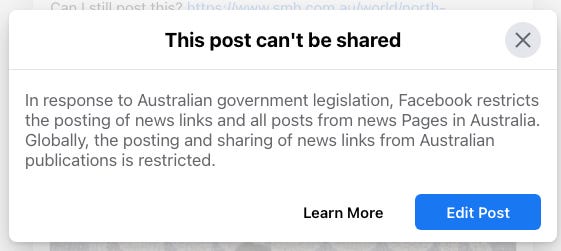Facebook Just Unfriended All of Australia. Is this a Sign of Trouble Ahead for the Company?
In response to a new proposed bill, Facebook decided that users in Australia may no longer share and view news on its platform. What does this portend?
Facebook managed to anger nearly everyone in Australia yesterday as it informed users there that they would no longer be able to share or view news from local or international sources on its platform. The closely watched move follows months of tense but ultimately failed negotiations over a proposed “Media Bargaining” law that would require tech companies such as Facebook and Google to pay licenses to Australian publishers for content that appears on their platforms.
Australian lawmakers argue that Facebook takes unfair advantage of publishers by allowing and benefiting from the free distribution of news articles. With a near monopolistic hold over shared news and information via social media, Facebook can squeeze any publisher and force it to essentially give away its content, which the platform then uses to keep users engaged and viewing its newsfeed ads—money that Facebook, and not the publisher, realizes.
Facebook countered, in a blog post on its website, that the “proposed law fundamentally misunderstands the relationship between our platform and publishers who use it to share news content.” Responding to the outrage following its blackout of news links, Facebook said the new law “left us facing a stark choice: attempt to comply with a law that ignores the realities of this relationship, or stop allowing news content on our services in Australia. With a heavy heart, we are choosing the latter.”
Australia is a relatively small country and market, so Facebook’s line in the sand is likely a test of larger political waters. Other countries are weighing stricter regulations of the tech giants, especially as more local news outlets are pushed to extinction. The move is expected to add weight to the argument of those seeking greater oversight over big tech. For example, the chairman of the U.K.’s News Media Association blasted Facebook’s ban as “a classic example of a monopoly power being the school yard bully, trying to protect its dominant position with scant regard for the citizens and customers it supposedly serves.” He stated further, “Facebook’s actions in Australia demonstrate precisely why we need jurisdictions across the globe, including the U.K., to coordinate to deliver robust regulation to create a truly level playing between the tech giants and news publishers.”
Why would Facebook risk the ire of its customers and international regulators, who already view it with a skeptical eye? On the one hand, the company’s position is technically correct: Facebook does not itself distribute the content, it merely acts as a host to others who post and share it. On the other hand, it is becoming increasingly untenable for Facebook to pretend it is merely a distribution company, especially when it has had to monitor and make subjective decisions over user-shared content due to the rise of conspiracies, misinformation and even violence promoted on its platform.
The speed and heavy-handedness with which Facebook acted to shut down news in Australia raised two additional concerns. First, the sweeping restrictions hit several non-news pages, from government websites to non-profits, and temporarily shut them down completely. Some official health pages and emergency warnings got scrubbed along with news sites, which raised howls because the Australian government is in the middle of a massive national vaccination campaign. “Facebook's actions to unfriend Australia today, cutting off essential information services on health and emergency services, were as arrogant as they were disappointing,” Prime Minister Scott Morrison wrote, somewhat ironically on his own Facebook page. The company responded that the draft law did not provide clearly defined news content, but that it would restore pages that had been taken down by mistake as quickly as it could.
Second, critics quickly pointed out that Facebook has now demonstrated it is able to act very quickly to protect its own economic interests by shutting down news links it might have to pay for, but has dragged its feet for years in shutting down dangerous sources of misinformation, often claiming it was too difficult a task to undertake comprehensively. Facebook may have inadvertently given strength to the argument that it is fully capable of acting decisively when it takes the matter seriously.
In the end, Facebook’s hard-line stance is a bit puzzling. In the U.S. and the U.K., Facebook has already conceded a bit of the point by creating a “News” tab in which it pays major news publishers to distribute their content through partnerships. It’s not clear whether such a move would have satisfied Australian lawmakers, who appear to be pressing Facebook to share its wealth more evenly.
At least some of Facebook’s management team understand that a healthy publisher ecosystem, especially one where local news is supported, makes not only for a better information ecosystem but also a better society. That is why the company earlier had announced it would begin to up-rank local news outlets and publishers in its newsfeed. The move in Australia appears to run counter to this philosophy and may reflect Facebook’s jitters over increased governmental regulation over its operations.




I notice that FB hasn't shut down mis-information sites. On the other hand, the legislation the Australian Government is proposing is to protect Murdoch's media empire from having to pay any licence fees. It's also interesting to note that the Australian Federal Government is battling a number of nasty scandals right now so having Facebook go "silent" on the news right now is a bonus for them. Rape, rorts and corruption allegations have been all over Australian social media and there will be an election this year.
Apparently FB can protect its own interests at the speed of light. It does anger me now as it has in the past about their reluctance to shut down more harmful sites and users.